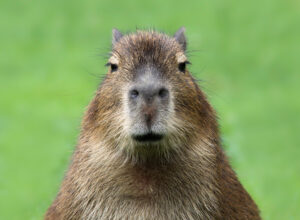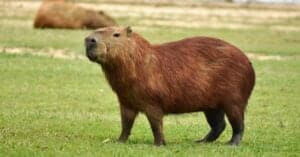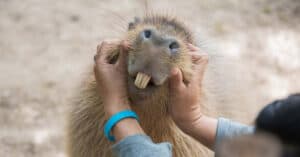Imagine coming home to find a capybara lazing in your backyard pond. That’s the reality for a growing number of exotic pet owners — but it comes at a substantial cost. Capybaras, hailed as the world’s largest rodents, are increasingly attracting interest as exotic pets. Known for their calm and friendly nature, these large rodents from South America need a special type of care. So it’s more like maintaining a small ecosystem than typical pet care. This comprehensive guide delves into the key aspects of capybara ownership, covering cost estimates, legal implications, healthcare requirements, environmental necessities, and more.
Understanding Capybaras: Social and Environmental Needs
Capybaras are naturally social animals that thrive in communal environments. In their natural ecosystems, these creatures form herds of approximately 10 to 20. Additionally, they display complex social behaviors such as mutual grooming and vocal communication, vital for their emotional well-being.
Capybaras require an environment that can accommodate their unique needs. As large, semi-aquatic creatures, they need ample space and a body of water for swimming and relaxation. Meeting these environmental and social requirements in a human-dominated environment presents a significant challenge. They have adapted to chew almost anything, which can cause damage and create more challenges for potential owners.
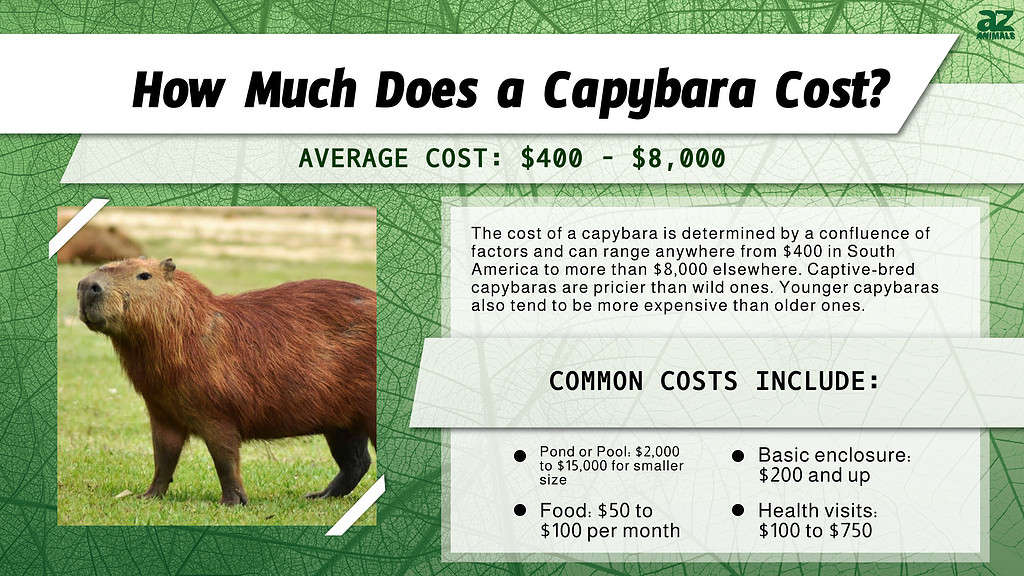
Capybara Pricing and Associated Upfront Costs
The cost of acquiring a capybara can vary considerably. It’s influenced by several factors, including the animal’s age, health, genetic traits, and breeding capabilities, as well as the location of the source or breeder.
Younger capybaras are generally more expensive than their older counterparts. They are cuter and have greater potential for adaptability. Moreover, the capybara’s health also significantly affects its price, with healthier individuals demanding higher prices.
Breeding potential further plays into the equation. Purebred and healthy capybaras with desirable traits are usually more expensive. Females often command higher prices for their breeding abilities.
Bulk purchases or repeat buyers may receive discounts, adding another dimension to the price variability. On the other hand, captive-bred capybaras are generally pricier than those caught in the wild, emphasizing the influence of the source or breeder’s location on the pricing. For instance, prices could range anywhere from $1,500 to $5,000 or more.
Geographical location also significantly impacts the cost. Purchasing a capybara from its native regions, such as South America, or even from certain locations within the United States like Georgia, could increase the price tag dramatically, ranging from $1,000 to $3,000, and sometimes even surpassing $8,000.
When considering online listings, such as those on ExoticAnimalsForSale.net, prices display wide variance too. For instance, as of the time of writing, mated pairs of capybaras are listed at $8,000, while 13-week-old baby capybaras start at $1,000 and can climb higher.
Given these complexities, potential owners should do thorough research and strive to purchase these unique pets from licensed and reputable breeders. Not only is buying from an unlicensed breeder or illegally importing a capybara unethical, it’s also illegal.
Ultimately, the cost of a capybara is determined by a confluence of factors and can range anywhere from $400 in South America to more than $8,000 elsewhere.
Capybara Costs By Category
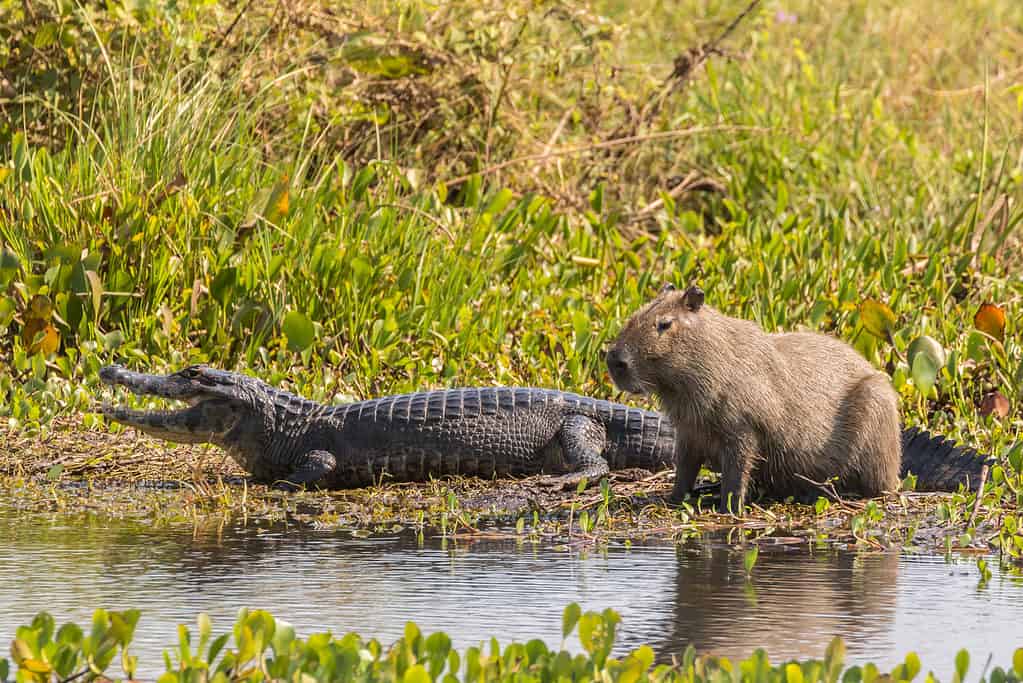
Capybaras really don’t pose any threat to anyone around them, so most animals just leave them be.
©Danita Delimont/Shutterstock.com
Beyond the initial purchase, here are some estimates and ranges for the costs associated with capybara pet ownership.
Enclosure and Supplies
Construction of Enclosure
The setup cost of a basic enclosure is around $200. However, the cost can vary significantly depending on the materials used, the size of the enclosure, and labor costs if professional installation is needed.
Water Feature
The cost of installing a pond or pool can vary widely depending on the size and complexity of the feature. Prices vary, from around $2,000 for a simple pond to $15,000 for custom-made ponds and up to around $80,000 for natural swimming pools and artificial lakes.
Heated Shelter
The cost of a heated shelter can also vary widely depending on the size of the shelter, the heating method used, and the cost of ongoing electricity to run the heater. Expect to pay anywhere from $500 to $1,500 on average.
Substrates
The cost of natural substrates such as mulch, sod, hay, and river rock can add to the cost, but specific estimates are not readily available. Expect to pay an average of $50 – $150 per cubic yard.
Enrichment Items
The cost of toys and puzzles for your capybara can vary depending on the items chosen. While costs are low in this area, enthusiastic pet owners often splurge, which adds up.
Capybara Diet
Specialized Rodent Pellets
The cost of these can vary, but owners should budget for around $50-$100 per month for food.
Hay or Grass
The cost of hay or grass can vary depending on the time of year and availability. Expect to spend around $100 for hay during the winter months if you do not live in a very warm climate with fresh grass available year-round.
Healthcare
Regular Veterinary Check-Ups
The cost of these visits can vary based on your capybara’s age and health, but specific estimates are not readily available. For a basic check-up, expect to pay anywhere from $50 to $150. You will also want to factor in vaccination costs, which often range between $50 to $100 and up.
Treatment Costs
The cost of treating health issues such as dental complications, respiratory diseases, skin conditions, and parasites can be substantial, but specific estimates are not readily available. For example, care such as dental and cancer screening usually runs about $300 to $500.
Legal Costs
Permitting and Licensing Fees
The cost of acquiring the necessary permits or licenses varies by state and country. Although specific estimates are not readily available, permit costs are generally nominal, anywhere from $10 to $75 plus annually. As with all laws and regulations, these figures are subject to change.
Legal Advice
The cost of consulting an attorney specializing in exotic animal laws can vary, but specific estimates are not readily available. Although attorney fees can run as low as $50 per hour and as high as several thousand dollars per hour, the average rate in the US is around $300 per hour.
Please note that these are rough estimates, and the actual costs can vary based on a variety of factors. It’s also important to note that capybara ownership is not legal in all areas, so it’s crucial to check local laws and regulations before deciding to get a capybara as a pet.
| One-Time Costs | Periodic Costs | Ongoing Costs |
|---|---|---|
| Purchase: $400 to $8,000 | Health visits: $100 to $750 | Electricity to run heated shelter |
| Basic enclosure: $200 and up | Food: $50 to $100 per month | |
| Heater shelter (for cold climates): $500 to $1,500 | Hay (for colder climates): $100 for winter season | |
| Pond or pool: $2,000 to $15,000 for average size and up to $80,000 for larger ones | ||
| Natural substrates: $50 to $150 | ||
| Miscellaneous (toys, permits, legal consult) $100 to $700 and up | ||
| Total range: $2,750 to $90,750 ($25,750 is we replace the most expensive large pool with an average size one) |
Navigating the Legal Landscape of Owning a Capybara
Owning a capybara as a pet comes with specific legal considerations. In many states across the US, capybara ownership is prohibited. Therefore, it is vital to check local laws before deciding to own one of these fascinating creatures. In other countries around the world, keeping capybaras as pets is outlawed. The legal status of capybara ownership varies significantly by country and even by specific regions within countries.
In the United States, capybara ownership regulations vary widely from state to state. Some states, such as Texas, Pennsylvania, Nevada, Arizona, and Georgia, permit pet capybaras, albeit with certain restrictions. For instance, Texas requires a noncommercial game animal breeder’s permit to own a capybara. It’s crucial to note that even within states where capybara ownership is legal, specific cities may prohibit them. Therefore, understanding your local laws is paramount.
In contrast, states like California and New York have more stringent rules. In California, only individuals authorized for scientific or educational purposes can own capybaras, as they are a restricted species. New York State classifies capybaras as wild animals, thus requiring a special license to keep them as pets.
Heading north to Canada, the regulations continue to vary. Capybaras are classified as exotic animals in Canada, and most provinces and territories require a special permit or license to own one. In Ontario, you must obtain a permit from the Ministry of Natural Resources and Forestry, while in Quebec, a permit from the Ministry of Forests, Wildlife and Parks is required. Additionally, Quebec mandates that capybaras must be microchipped, registered, and that the owner must have a contingency plan in case the animal escapes. In British Columbia, capybaras are prohibited as pets under the Controlled Alien Species Regulation.
To navigate these laws and regulations, potential capybara owners should consider the following steps.
Research State Laws
Start by researching the laws regarding capybara ownership in your specific region. Each jurisdiction may have different regulations and restrictions.
Contact Local Authorities
After researching the regional laws, reach out to local authorities, such as your area’s Department of Fish and Wildlife. They can provide the most accurate and current information on capybara ownership and the necessary permits.
Consult Exotic Animal Organizations
Local exotic animal organizations or pet groups may have additional information on capybara ownership regulations. They can provide guidance and support in understanding the legal requirements and the process for obtaining the necessary permits.
Seek Legal Advice
If there are any complexities regarding capybara ownership in your region or you are unsure about the information you have found, consider seeking advice from an attorney specializing in exotic animal laws. They can provide specific guidance based on your region’s regulations and help navigate the permit process.
Remember, laws and regulations can change over time. Always have the latest information from trusted sources to follow all legal rules. This protects you and helps promote ethical care for these unique animals.
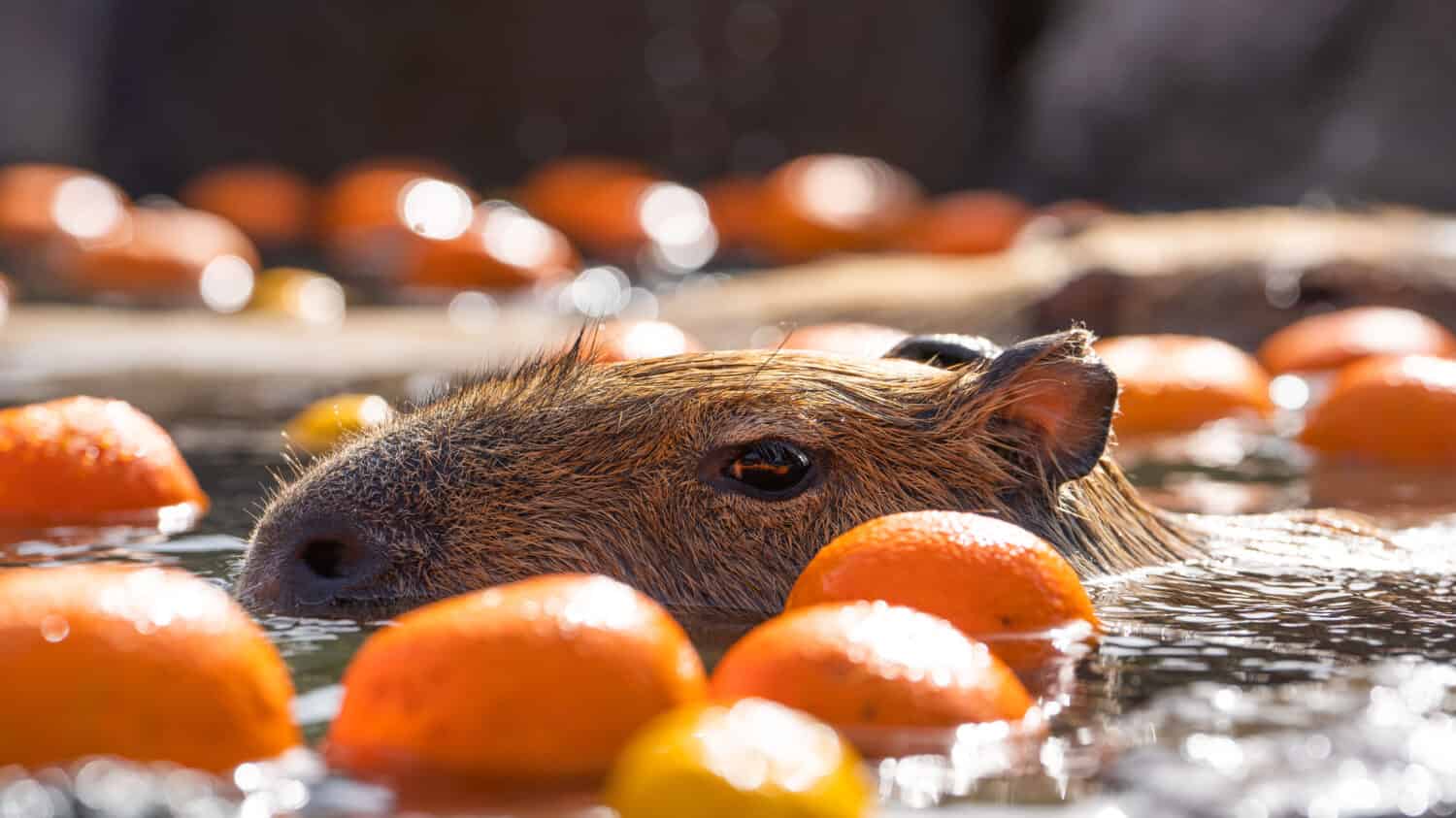
Access to a pool or pond is essential to the health of capybaras. They even enjoy citrus onsen (hot springs) in Japan!
©Oakland Images/Shutterstock.com
Creating the Right Capybara Environment: Enclosures and Supplies
It’s crucial to create the right environment for a capybara. They need access to a water body for swimming as they are semi-aquatic animals. Their enclosure should be large (at least 95 meters squared), well-fenced to stop them from escaping, and include a heated shelter if you live in a colder climate.
The enclosure should mimic their natural habitat, incorporating natural substrates like mulch, sod, hay, and river rock for mental stimulation. Enrichment items such as toys and puzzles can also contribute to their mental well-being.
Capybara Diet and Healthcare Requirements
Capybaras thrive primarily on grasses and aquatic plants in the wild. It is vital to emulate this diet closely when owning a capybara, supplemented with specialized rodent pellets, to ensure that they receive all the necessary nutrients. Regular access to hay or grass is also crucial because of their continuously growing teeth, which require the wear from chewing fibrous plant material.
Regular veterinary check-ups with a vet specializing in exotic animals are necessary to detect and treat common health issues, including dental complications, respiratory diseases, skin conditions, and parasites.
The Ethical Implications and Trends in Capybara Ownership
Although legal implications are vital, ethical considerations should not be overlooked. The pet trade can inadvertently contribute to the decline of wild populations and disruptions in natural ecosystems. The recent surge in the popularity of capybaras as pets, driven by their inherent cuteness, has raised ethical concerns. Many pet capybaras suffer from stress and health issues due to improper care, often leading to mistreatment and abandonment as they mature and become more difficult to manage.
Pros and Cons of Capybara Ownership
Capybaras can be unique and interesting pets due to their large size, natural swimming abilities, social nature, and low maintenance. Their smartness and ability to be trained make them even more appealing. However, potential owners must consider the challenges. These include the need for ample space and access to a swimming area, compliance with legal restrictions, maintaining a specialized diet, finding an exotic animal vet, and dedicating time for socialization and interaction. Prospective capybara owners must also consider long-term commitment, possible changes in personal circumstances, environmental and ethical considerations, and the impact on native ecosystems and animal welfare.
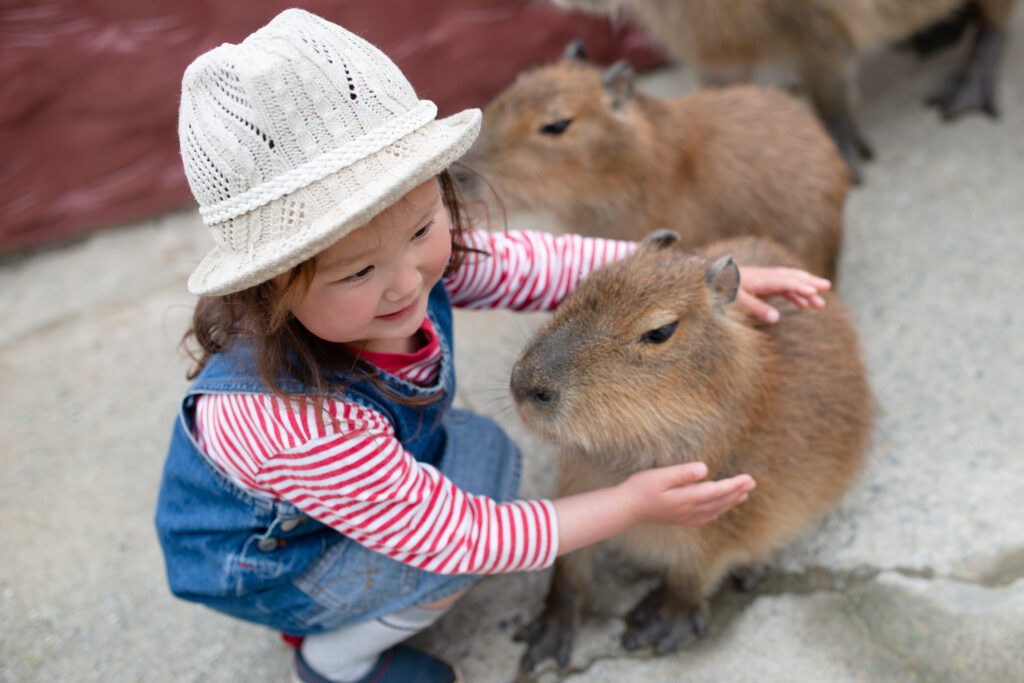
Even though it’s legal to own a capybara as a pet, you want to make sure you’re able to provide for all their needs. This includes enough land, water source, fellow capybaras, and so forth.
©iStock.com/Hakase_
Conclusion
Owning a capybara is a substantial long-term undertaking that demands considerable resources, knowledge, and preparation. Although capybaras can make unique and fascinating pets, prospective owners should carefully consider their ability to meet these creatures’ distinctive needs and provide a nurturing environment that promotes their well-being. Comprehensive research, planning, and consultation with capybara experts, breeders, and exotic veterinarians are essential before embarking on the capybara ownership journey. A conscious and well-informed approach will ensure a rewarding experience, fostering a harmonious bond between you and your capybara, while promoting ethical pet ownership.
Whether you are an animal enthusiast interested in the unique challenge of caring for the world’s largest rodent or you are simply exploring the possibility, we hope this guide has provided valuable insights into the world of capybara ownership. Capybaras, like any pet, are sentient beings deserving of compassion, respect, and proper treatment. As potential capybara owners, what we do and choose can greatly affect these wonderful creatures’ welfare and the larger ecosystems where they live.
Having a pet, whether it’s a dog, a cat, or a capybara, isn’t just about the joy and companionship they provide. Giving them a loving home, ensuring their health and happiness, and respecting their natural instincts and needs are also part of our responsibility towards them.
The photo featured at the top of this post is © Henner Damke/Shutterstock.com
Thank you for reading! Have some feedback for us? Contact the AZ Animals editorial team.



